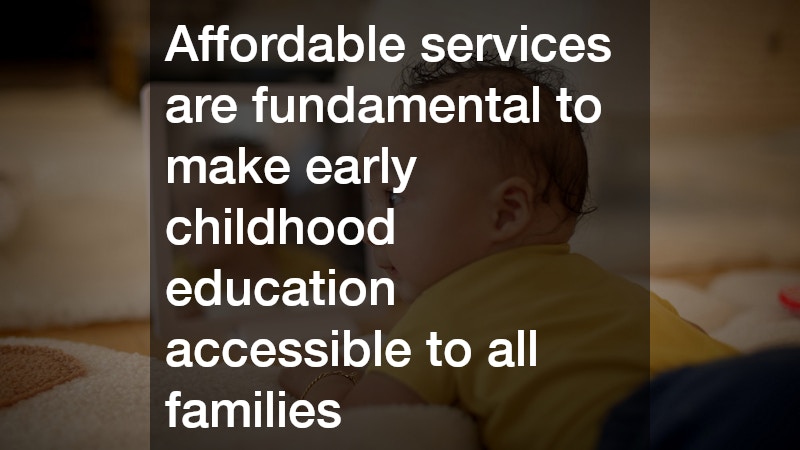In today’s economy, finding reliable and affordable child care services is a challenging task for many parents. This issue has significant implications for not only individual families but also society as a whole, as early childhood education plays a crucial role in a child’s development. By understanding the importance of affordability and access in child care, we can work towards solutions that benefit everyone.
The Importance
Ensuring that children have access to reliable early education sets the foundation for lifelong learning and development. High-quality child care services provide children with valuable opportunities to develop critical social, cognitive, and motor skills. However, the high cost of child care services often excludes families from accessing these benefits, which can widen disparities in educational outcomes.
Research shows that affordable child care services can significantly enhance a child’s early educational experience. When families have access to affordable options, parents can work without the stress of overwhelming child care expenses. Moreover, affordable services enable more children to benefit from structured educational environments, contributing to their overall growth and development.
Removing financial barriers to access child care not only positively impacts children but also supports economic growth. Parents, especially single parents, can pursue education or employment, contributing to their household’s and the economy’s productivity. Consequently, affordable child care services are essential for building a thriving society with equal opportunities for all its members.
Challenges in Access
Many families face significant challenges in accessing affordable child care services. High demand and limited supply result in long waiting lists, forcing families to seek alternative, often substandard options. Furthermore, child care costs are rising faster than the rate of inflation, making it increasingly difficult for families to find services that fit within their budget.
Government efforts to provide subsidies and financial assistance for child care have not been enough to meet the needs of all families. The gap continues to grow due to insufficient funding and a lack of coordination between federal, state, and local programs. These challenges can deter parents from working or advancing their careers, perpetuating the cycle of limited access and missed opportunities.
Moreover, rural areas and low-income communities face even steeper hurdles in finding accessible services. The lack of nearby options, combined with transportation barriers, often leaves families in these regions without viable choices. Addressing these challenges requires a multifaceted approach, from increasing funding to expanding the availability of services in underserved areas.
Solutions for Making it Affordable and Accessible
One potential solution is increasing government investment in affordable child care services to bridge the financial gap for families in need. Expanding financial assistance programs can help lower-income families gain access to high-quality care without sacrificing their budget. By strengthening the collaboration between federal, state, and local governments, more cohesive programs can be implemented, offering comprehensive support to families.
Encouraging private sector investment can also play a crucial role in making child care services more accessible. Employers that provide on-site child care or offer subsidies can alleviate the burden of child care costs for their employees. Furthermore, partnerships with child care organizations can help deliver innovative models of affordable care that benefit both families and businesses.
Community-based initiatives can also enhance the availability of affordable child care services. Developing child care cooperatives allows families to pool resources and share responsibilities, creating a supportive network. Additionally, using technology to streamline service delivery and access can make it easier for families to find and secure quality child care options within their budget.
The Future: Making Progress Towards Accessibility
The future of child care services depends on multi-stakeholder cooperation to ensure affordability and equity. As awareness increases around the importance of early childhood education, more resources must be allocated to expanding access. By prioritizing funding for affordable child care services, policymakers can make strides toward closing the accessibility gap and fostering a more inclusive society.
Public advocacy and awareness campaigns can help drive legislative change focused on increasing accessibility. By voicing the critical need for affordable child care, communities can influence policy developments. Collaboration between stakeholders, including governments, businesses, and non-profits, is essential in crafting sustainable solutions that address the needs of all families.
Finally, fostering innovation within the child care industry can revolutionize how services are delivered and accessed. Utilizing technology and progressive frameworks can enhance the quality of care while reducing costs for families. The future of child care services lies in creative solutions that prioritize affordability, accessibility, and high-quality early education for every child.
Affordable child care services are fundamental to making early childhood education accessible to all families, irrespective of their socioeconomic status. By addressing the challenges of high costs and limited supply, society can ensure that every child receives the educational opportunities they deserve. Through increased investment, cross-sector collaboration, and innovative practices, we can build a future where affordable child care becomes a reality for families across the nation.




